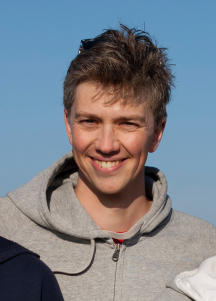Q&A: Dr Tim Walker
Posted on November 20, 2015 by Benjamin Thompson
Tomorrow, at the Federation of Infection Societies (FIS) 2015 conference, Dr Tim Walker will be giving the British Infection Association’s Barnett Christie lecture about his work on the genome sequencing of Mycobacterium tuberculosis. We asked him about his career and his research.

How would you describe a typical day at work?
At the moment I’ve got a job that is half-academic and half-clinical, so it really depends what day it is.
I’m a medical doctor, a Registrar in a clinical microbiology laboratory in the John Radcliffe Hospital, Oxford, training in microbiology and infectious diseases. Any clinical sample from the patients in our Trust comes to our lab and I act as the interface between the scientists and the clinicians.
In parallel, I’m carving out an academic career; I’ve done a PhD and am part of a large research group at the University of Oxford. I’m either in the laboratory working with TB strains, or at a computer looking at whole genome sequences.
Your first degree was in Politics, Philosophy and Economics. Why did you change fields?
I was very focused on humanities at school and wasn’t particularly interested in science – it was only after finishing my degree that I had to have a think about what I wanted to do for the rest of my life. On the one hand, I would have loved to have been a political philosopher, but I’m not sure I would have made much difference to anyone. I wanted to do something socially useful and medicine seemed like a reasonable way of achieving this. I was extremely fortunate; I got a place in medical school three weeks after deciding it was what I wanted to do – it was a bit of a whirlwind.
At what point did you decide to lean more towards science?
After I’d qualified and done three years of clinical work, I started to think that maybe research was the way forward. I still enjoy clinical work, but I wanted something more. Being able to jump from one to the other was a very attractive balance and it’s turned out to be a good thing.
What’s your field of TB research?
The unifying factor with all the work we do is Whole Genome Sequencing. We’re taking advantage of new technologies that allow us to sequence large amounts of pathogen genomes rapidly and cheaply.
The initial focus of our work was to use these technologies to better identify person-to-person TB transmission and translate that knowledge into improved public health interventions.
How will Whole Genome Sequencing make a difference in patient treatment? Where do you see this new technology leading?
I think we’re at one of the most important times in microbiology since we first started identifying and cultivating bacteria. We’re now starting to transition away from culture and base most, if not all, of our diagnostic efforts on molecular and sequencing data. TB is leading this field for a number of reasons, not least because it is a relatively slow-growing organism, so culturing creates long delays to obtaining useful clinical data.
We’re working towards a future where we’ll be able to obtain all the information needed to treat a patient and control a disease in a community from a single genomic sequence, rather than from a group of tests that each give out fragments of information.
Once we’ve achieved that it’s not hard to imagine the clinical possibilities. Genome sequencers are getting smaller and cheaper, and the software is getting faster – these can be run from a laptop, which could itself be run by a solar panel. You could take this combination and run it in a low resource setting – where most TB is – and have a point-of-care test that rapidly gives you all the results you want.
Has your medical job helped your scientific one, and vice versa?
Very much so. Because the research we do is so translational the two naturally feed into each other. As a scientist, you want to know what the clinician needs, in order to design something that is user-friendly and that will be used. You also want to create something that people are comfortable using; otherwise they’ll revert to what they’re used to.
As a clinician, your day-to-day activity throws up new questions, which you might want to address through research. If you’re completely detached from clinical medicine it can be difficult to focus on what matters.
What will you be talking about in your lecture tomorrow?
I’m going to present the work my colleagues and I have done over the last five years and how we’ve used sequencing to learn about TB transmission, species identification and drug resistance. The title of my talk is Whole Genome Sequencing of M. tuberculosis: how big a revolution? – given that I’ve said it’s possibly the biggest change in 130 years, I’d say the answer is very!
What does being invited to give this lecture mean to you?
It’s very flattering, but this work is not an individual effort; you can only do it with a large group of collaborators. We’ve got a multidisciplinary team in Oxford, but we also work with researchers elsewhere in the UK and internationally. All the research is a synthesis of thought and effort from many people.
